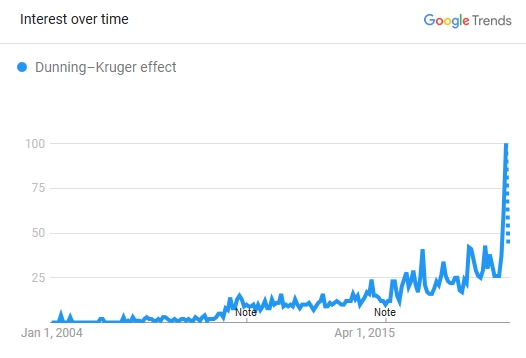“It is one of the essential features of such incompetence that the person so afflicted is incapable of knowing that he is incompetent. To have such knowledge would already be to remedy a good portion of the offense.” ~Wm. Ian Miller, "Humiliation," 1993 https://www.amazon.com/Humiliation-Thomas-Professor-William-Miller-dp-0801428815/dp/0801428815/">https://www.amazon.com/Humiliati... 1/
That& #39;s the epigraph from "Unskilled and Unaware of It: How Difficulties in Recognizing One& #39;s Own Incompetence Lead to Inflated Self-Assessments" by Justin Kruger and David Dunning, i.e. the important 1999 paper describing the "Dunning-Kruger effect" https://psycnet.apa.org/record/1999-15054-002">https://psycnet.apa.org/record/19... 2/
References to the Dunning-Kruger effect have exploded in the last few years, but, as with so many truly great papers (cf. "Bad Is Stronger Than Good"), the original is well worth a read, even (and perhaps especially, in this case), when we "get the gist." 3/
"Although our analysis suggests that incompetent individuals are unable to spot their poor performances themselves, one would have thought negative feedback would have been inevitable at some point in their academic career..." 4/
"So why had they not learned? One reason is that people seldom receive negative feedback about their skills and abilities from others in everyday life…" 5/
“Second…some tasks and settings preclude people from receiving self-correcting information that would reveal the suboptimal nature of their decisions...” 6/
“Third, even if people receive negative feedback, they still must come to an accurate understanding of why that failure has occurred. The problem with failure is that it is subject to more attributional ambiguity than success…” 7/
“For success to occur, many things must go right: The person must be skilled, apply effort, and perhaps be a bit lucky. For failure to occur, the lack of any one of these components is sufficient…” 8/
"Because of this, even if people receive feedback that points to a lack of skill, they may attribute it to some other factor..." 9/
“Finally…incompetent individuals may be unable to take full advantage of one particular kind of feedback: social comparison. One of the ways people gain insight into their own competence is by watching the behavior of others…” 10/
“In a perfect world, everyone could see the judgments and decisions that other people reach, accurately assess how competent those decisions are, and then revise their view of their own competence by comparison...” 11/
"However…incompetent individuals are unable to take full advantage of such opportunities. Compared with their more expert peers, they were less able to spot competence when they saw it, & as a consequence, were less able to learn that their ability estimates were incorrect." 12/
From "Unskilled and Unaware of It: How Difficulties in Recognizing One& #39;s Own Incompetence Lead to Inflated Self-Assessments" by Justin Kruger & David Dunning, aka the "Dunning-Kruger effect" paper. Good to remind ourselves of it on a regular basis :-) https://psycnet.apa.org/record/1999-15054-002">https://psycnet.apa.org/record/19... 13//

 Read on Twitter
Read on Twitter


